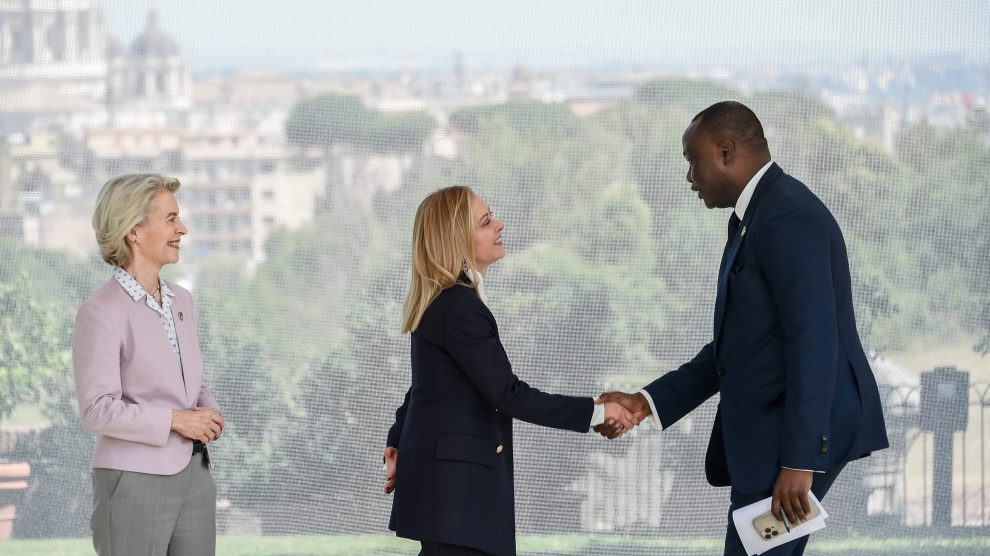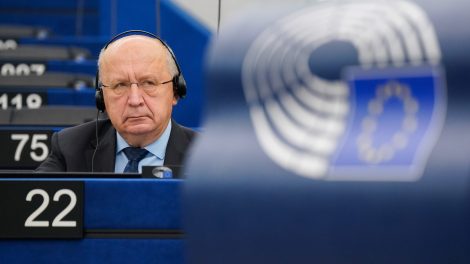All roads lead to Rome. EU’s Global Gateway and Italy’s Mattei Plan “reflect renewed European commitment to Africa, encouraging a shift from donor-recipient dynamics to mutually beneficial engagement”, Samaila Zubairu, CEO at Africa Finance Corporation, said in an interview with our sister website Formiche.
- While the Global Gateway “provides an EU-wide framework focused on infrastructure, energy, digital, and education”, the Mattei Plan is “a more targeted, bilateral strategy by Italy, emphasising energy partnerships and sustainable development,” added Zubairu.
- Last week, he joined the summit “The Mattei Plan for Africa and the Global Gateway” in Rome, co-chaired by Italian Prime Minister Giorgia Meloni and European Commission President Ursula von der Leyen.
- Both frameworks are aligned with Africa’s development priorities and national agendas.
Local ownership and flagship projects. “African institutions and governments must be involved from the outset, from design to decision-making and delivery”, Zubairu stated.
- “Then, concessional funding must be used to de-risk and mobilise private capital, especially for large-scale infrastructure”, he added.
- “Early, high-impact successes are essential to building trust, such as regional energy infrastructure or industrial corridors. Finally, projects must support local industry, jobs, and long-term value creation—not just raw material extraction.”
Channelling the capital. AFC has published its 2025 State of Infrastructure Report on Domestic Resource Mobilisation, which estimates Africa’s domestic capital pools at around $4 trillion—$1.1 trillion in institutional capital, $2.5 trillion in commercial banking assets, and $470 billion in external reserves.
- Zubairu explained in the interview that the challenge is to channel these resources into the real economy through investment vehicles that support strategic sectors such as energy, transport, and logistics.
An energy-starved continent. In 2024, Africa added 6.5 GW of utility-scale capacity to its grid, but it remains far behind emerging economies like India.
- “The continent is home to the largest untapped hydropower potential, the largest conventional geothermal reserves, and receives some of the highest solar irradiation globally,” said Zubairu.
- “With the right investment and planning, Africa can become a global leader in clean, abundant energy and use it as a base for deep industrialisation.”
Beyond resource export. According to the AFC’s CEO, Africa must also unlock the potential of industrial supply chains in fertilisers, refining, and steel.
- “With a surge in iron ore supply, we can centralise processing in energy-rich industrial hubs connected to regional fabrication markets and double production by the early 2030s.”
- “In fertilisers, we already have everything: natural gas, phosphate, potash. What’s missing is infrastructure to convert raw materials into local value.”
Connecting the continent. AFC reports around 7,000 km of new railway lines under construction or in the planning phase, along with major rehabilitation programmes for existing networks.
- “This is a critical window to unlock regional trade, support urban growth, and operationalise the African Continental Free Trade Area.”
A new African development model. AFC has invested over $16 billion across 36 African countries, focusing on strategic infrastructure and applying a model that blends development impact with commercial return.
- “We do not build aid-based infrastructure. We create revenue-generating assets by mobilising capital from institutional investors, African pension funds, and sovereign wealth funds,” said Zubairu.
AAA Rating. AFC aims to strengthen its access to global markets thanks to its AAA ratings from S&P Global China Ratings and China Chengxin.
- It has also surpassed $1 billion in annual revenue.
- “We have demonstrated that African DFIs can be scalable and resilient while delivering development outcomes,” the CEO said.
From vision to execution. Projects like the Dangote Refinery, Xlinks, Kamoa-Kakula, Infinity Power, and Red Sea Power—set to make Djibouti the first African country fully powered by renewables—exemplify AFC’s operational pragmatism.
- “When we realised raising financing for Red Sea Power would cause unacceptable delays, we provided the bridging loan and moved the project from inception to completion in record time, even during Covid.”
The Lobito corridor, a symbol. During the Rome summit, AFC signed a €250 million, 10-year credit facility with Italy’s state lender Cassa Depositi e Prestiti, backed up to 80% by export credit agency SACE.
- The financing will support the development of the Lobito Corridor, a commercial railway line connecting Angola, Zambia, and the Democratic Republic of Congo, with AFC serving as the lead developer.
- “It is a transformational project that will reduce transport times from mine to port from 45 days to just one week, cut 300,000 tons of CO₂ emissions per year, and connect African resources to global value chains,” Zubairu concluded.





